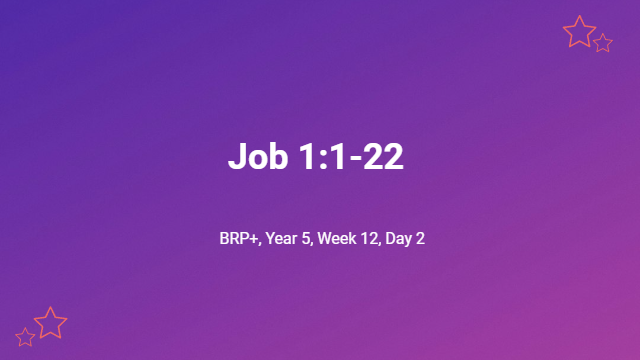Job 1:1-22
Q.1. What kind of a man was Job? How had God rewarded him? How concerned was Job about his family? How did he show he truly cared? – (Job 1:1-5)
Job was a real person (Ezk.14:14, 20). The story seems to be set in the time of the patriarchs Abraham, Isaac, and Jacob. (Supporting this is that Job acted as priest for his family, and the Sabeans and Chaldeans lived during that period). Job was an outstanding man of God, who – … was blameless, upright, fearing God and turning away from evil (Job.1:1). Not only had God blessed Job with a large and happy family, but he was also blessed with wealth and prestige among his countrymen (Job 1:2-4). As the head of his family, Job would carry out the priestly functions to atone for their sins – even those committed unintentionally (This role would be given to the priests and Levites in the Law of Moses). Job didn’t only provide generously for his family … he was a spiritual role model for them all. However, the family bliss was about to be interrupted.
Q.2. How much influence does Satan have over us? What is his realm of operation? What were his accusations against God and Job? – (Job 1:6-11)
Though Satan has been cast down to earth, he still has access to God’s throne room to act as the accuser of the saints of the Most-High God (Gen.3:1; Is.14:12; Ezk.28:13; Rev.12:9-10). He roams around the earth causing trouble – … Your adversary, the devil, prowls around like a roaring lion, seeking someone to devour (1 Pet.5:8). He tries to undermine the faith of God’s children and tries to disrupt the purposes of God (Job 1:9-11 c.f. 2:4-5 c.f. Lk.22:31-32).
Q.3. How much damage can Satan do to us? What sort of pain and suffering is attributed to Satan? Does Satan contribute to the welfare of anyone? – (Job.1:12-19)
Though God places limits upon the trials and tribulations Satan inflicts, nevertheless, he has extensive delegated power to destroy (Job 1:12 c.f. 2:6). He was able to erode Job’s wealth, kill his children and servants, inspire destruction through the elements, and personally afflict Job with chronic illness (Job 1:13-19 c.f. 2:7-8). The story of Job gave us an insight into the operations in the spiritual realm, and revealed the nastiness of Satan, as he smote Job in the most horrible of ways (c.f. Eph.3:10; 6:12). It suggested that godliness actually attracts the attention of Satan and guaranteed that saints will be tried. Although suffering can be very hard to explain, Satan’s attempts to destroy faith is actually used by God to strengthen faith (Jms.1:12; 1 Pet.1:7). Through every trial Satan brings upon us, God proves Himself to be the sovereign Lord over all we encounter. As Job concluded – “I know that You can do all things, and that no purpose of Yours can be thwarted (Job.42:2). This is the theme of the book, and the confidence of the believer, regardless of the trials life may serve up.
Q.4. How did Job respond to his losses and changed circumstances? What did this reveal about Job’s view of his prosperity? – (Job.1:20-22)
The reversal of his circumstances could not have been starker. However, Job never questioned – “Why me?” In fact his response was classic – … “Naked I came from my mother’s womb, and naked I shall return there. The Lord gave and the Lord has taken away. Blessed be the name of the Lord.” (Job 1:21). He refused to blame God, or sin against God. He never forgot from where his blessings had come. He recognized that no one can take wealth beyond the grave (1 Cor.4:7; 1 Tim.6:7). He had enjoyed what God had graciously provided. However, Job was not defined by his wealth.

